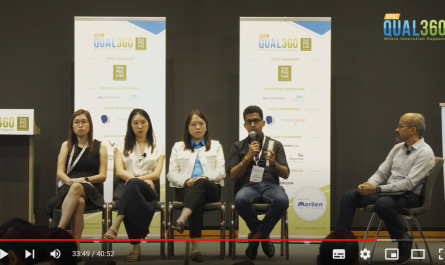Exciting new technological innovations, scientific advancements and new and interesting research techniques are fuelling a bright new era of qual. Massive opportunities are being presented to the industry as a result, but these come with substantial challenges too. So in a world where qual becomes more digital and the lines between qual and quant become increasingly blurred, how do we ensure that we retain the human, emotional side of qual and safeguard the actionable insights that the world’s brands are relying on?
In a future where machines are replacing moderators, what are us researchers going to do? An interesting question posed by a delegate at the end of a thought provoking panel discussion about how artificial intelligence can be used to bring Big Qual to life. Ok, so perhaps we don’t have to pack up our desks quite yet, but are bots really going to be taking over and, if so, what are the implications?
Vox Pops International were the official video sponsor of Merlien Institute’s Qual360 Europe conference in Amsterdam this February. Whilst we were there, we couldn’t resist taking the opportunity to ask industry experts about their outlook for qual research and what critical challenges they thought the industry was facing in this rapidly evolving world.
“The way the industry is changing at the minute, everything’s becoming very digital, it’s becoming online, fast, and cheap. So it’s trying to be more innovative, trying to come up with new ideas that will give the same quality of research with less quantity of time and money – that’s a big challenge from my perspective.”
– Melissa Gonsalves, Consumer Market Insight Manager, Unilever
A growing hunger for innovative, quick and cost-effective research methods together with a world of digitally-connected respondents, are paving the way for technological advancements such as virtual reality and artificial intelligence to play a significant role in the future of qual. Such methods are seen to offer the opportunity for researchers to spend less time gathering data and more time analysing and presenting it, as well as providing cost-saving benefits. Sabine Thermann, Research Manager at GIM and speaker at Qual360, shared her experiences of using virtual reality within automotive research, where the use of this technology saved hundreds of thousands of pounds by building a virtual concept car rather than a real life model. Paul Hudson, CEO of FlexMR discussed the application of artificially intelligent ‘chat bots’ to act as moderators, exploring how carefully programmed online chat functions can offer the ability to not only gather mass qualitative data, but also build rapport with respondents.
The importance of striking a balance between being innovative and retaining the ability to capture true insights was a concern that was widely shared. Experts are open to these new methods, but expect them to be tested versus more conventional techniques to ensure they successfully add long-term value to research projects, rather than acting as short-term gimmicks to satisfy a desire to ‘shake things up’. Andrew Riungu, Consumer Segments Research Manager at Safaricom, also expressed the importance of not underestimating the importance of human interaction within qual research to truly understand consumers from the very inside and tap into their key emotions.
“The challenge is, as we move more towards technology, let’s not forget being human, because qual is all about being human and that human interface is really important.”
– Andrew Riungu, Consumer Segments Research Manager at Safaricom
Experts also discussed the rising prominence of video within the industry, as both a data collection tool and a way of delivering insight. The rise of video opens up new questions about how to analyse this mass of data, as explored in an inspiring talk by Sam Paice, Client Director at Big Sofa, who discussed the use of tags within video-led insight creation. Vox Pops International also ran a pre-conference workshop, discussing how the challenge of exploiting this video data and turning it into actionable, insightful and impactful content can be achieved through careful curating and storytelling.
Ellie Osborne, Head of Research at MMR International, suggests that qual researchers face the challenge of needing to expand their skills remit in order to fully embrace new technology and video within qual research. Only then, whilst using existing foundations in learnings, can the industry truly take things forward.
The increased reliance on combined quant and qual techniques and multi-methodology research projects are also felt to be trends that will continue to grow rapidly, as clients seek to attain different perspectives. Whilst some fear that big data is leaving qual being overlooked in favour of the ‘big numbers’, many predict an increased interaction between qual and quant, providing a more flexible and multifaceted approach to conducting research within this increasingly complex world. The key challenges here are seen to be convincing stakeholders about the power of qual, which means helping define its role within research projects, as well as educating clients around the wide choice of qualitative research methods available.
Simon Tregidgo, Global Customer Insight Specialist at IKEA feels that the rise of digitalisation presents the opportunity to put the scale behind the more ‘fluffy’ side of qual, whilst Irem Erden, Regional Consumer Insights Manager at General Mills, believes the role of qual research is set to become even more important in this digital age, breathing life into the mass of quantitative data and acting as the true driving force for clients’ strategies.
“I think qual is becoming more and more important. As a strong believer of balancing the qual and quant I think qual becomes important to give life and breathe oxygen to the quantitative data. When you see just the quantitative data they say that can predict the future, but I think what feeds into the strategy is all about the qual. There are no more borders. I don’t think there is one fine line between these two methodologies anymore”
– Irem Erden, Regional Consumer Insights Manager at General Mills
‘Change is the name of the game’, Massimo Cealti, founding partner of Altitude C, so rightly exclaims, as he muses over the changes he’s seen during his qual research career to date. But equally he points out the importance of the industry taking time to discuss the potential consequences of such changes. ‘This idea of technology and artificial intelligence impacting society is something that we need to sit down and consider, because there are so many implications’.
Here at Vox Pops International we believe that quality, face to face moderation and filming can offer the most compelling and insightful qualitative research outputs – and no bot can replace that… for now anyway!
Editor’s note: The next Qual360 conferences will be held on April 5-6 in Washington D.C. and October 11-12 in Singapore. Visit Qual360 NA and Qual360 APAC for more info!












